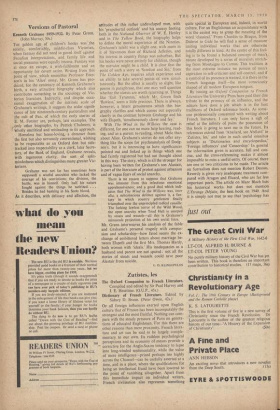Versions of Pastoral
Kenneth Grahame 1859-1932. By Peter Green. (John Murray, 30s.) THE golden age of children's books was the solidly, comfortably, middle-class Victorian, when fantasy did not need to guard itself against Freudian interpretations, and family life and social pressures were equally intense. Fantasy was at once an escape, a wish-fulfilment and an Opportunity for covert satire. Writing from this point of view, which resembles Professor Emp- son's in his 'Alice' essay, Mr. Green has pro- duced, for the centenary of Kenneth Grahame's birth, a very attractive biography which also contributes something to the sociology of Vic- torian literature. Indirectly, and despite occa- sional exaggeration of the intrinsic scale of Grahame's writings, it suggests the wider signifi- cance of late nineteenth-century pastoralism and the cult of Pan, of which the early stories of E. M. Forster are, perhaps, late examples. The only other biography, by Patrick Chalmers, is I Wholly uncritical and misleading in its approach.
• Homeless but home-loving, a dreamer from the first but also nervously conventional, wishing to be respectable as an Oxford don but side- tracked into respectability as a clerk, later Secre- tary, of the Bank of England, Grahame reveals, with ingenuous clarity, the sort of split- mindedness which distinguishes many greater Vic- torians.
• Grahame was not (as has sometimes been supposed) a wistful anarchist who lacked the courage of his convictions; the division, the battle, was in himself. Only half his nature fought against the things he satirized. . . . Besides he had banking in his Scots blood.
As it describes, with delicacy and affection, the
attitudes of this rather undeveloped man, with his 'prepubertal outlook' and his uneasy footing both in the National Observer of W. E. Henley and in 7'he Yellow Book, the biography helps to define the moral experience of the Nineties. Grahame's talent was a slight one, with more in it of Stevenson than of Richard Jefferies, and his interest in country things was suburban. But his books were never entirely for children, though the narrator might be a child. It is clear that the point of such a story as 'Sawdust and Sin,' from The Golden Age, requires adult experience and an ability to take several points of view simul- taneously. But the effect is usually so slight, like poems in paraphrase, that one may well question whether the stories are worth returning to. Things like 'Exit Tyrannus,' which Mr. Green finds 'flawless,' seem a little precious. There is always, however, a latent genuineness which this bio- graphy clarifies and which comes out especially clearly in the contrast between Graharue and his wife Elspeth, 'simultaneously clever and fey.'
With The Wind in the Willows the case is different, for one can no more help hearing, read- ing, and as a parent re-reading, about Mole than about Alice. Grahame's stories do not offer any- thing like the scope for psychoanalysis of Dodg- son's, but it is interesting to have significances pointed out and linked up in things which one had faintly registered but had not thought about in this way. The story, which is all the stronger for having been written for Grahame's son Alastair, is part of the literature of protest against urbanism and of vague fears of social anarchy.
There is no reason to suppose that Grahame was immune from this infectious emotional apprehensiveness; and a good deal which indi- cates that The Wind In the Willows was, inter alia, a subconscious defence against it, a fan- tasy in which country gentlemen finally triumphed over the unprincipled radical canaille. The lurking lawless terror of the Wild Wood, the open anarchy when Toad Hall is usurped by stoats and weasels—all this is Grahame's minuscule projection of his own social fears.
Mr. Green interweaves his analysis of the fable and Grahame's personal tragedy with compas- sion and scholarship—how fated seems the ex- change of embittered letters about marriage be- tween Elspeth and the first Mrs. Thomas Hardy, both women with 'ideals.' His inadequacies as a husband and parent are not spared : not all the stories of stoats and weasels could save poor Alastair from suicide.
G. D. KLINGOPULOS


















































 Previous page
Previous page